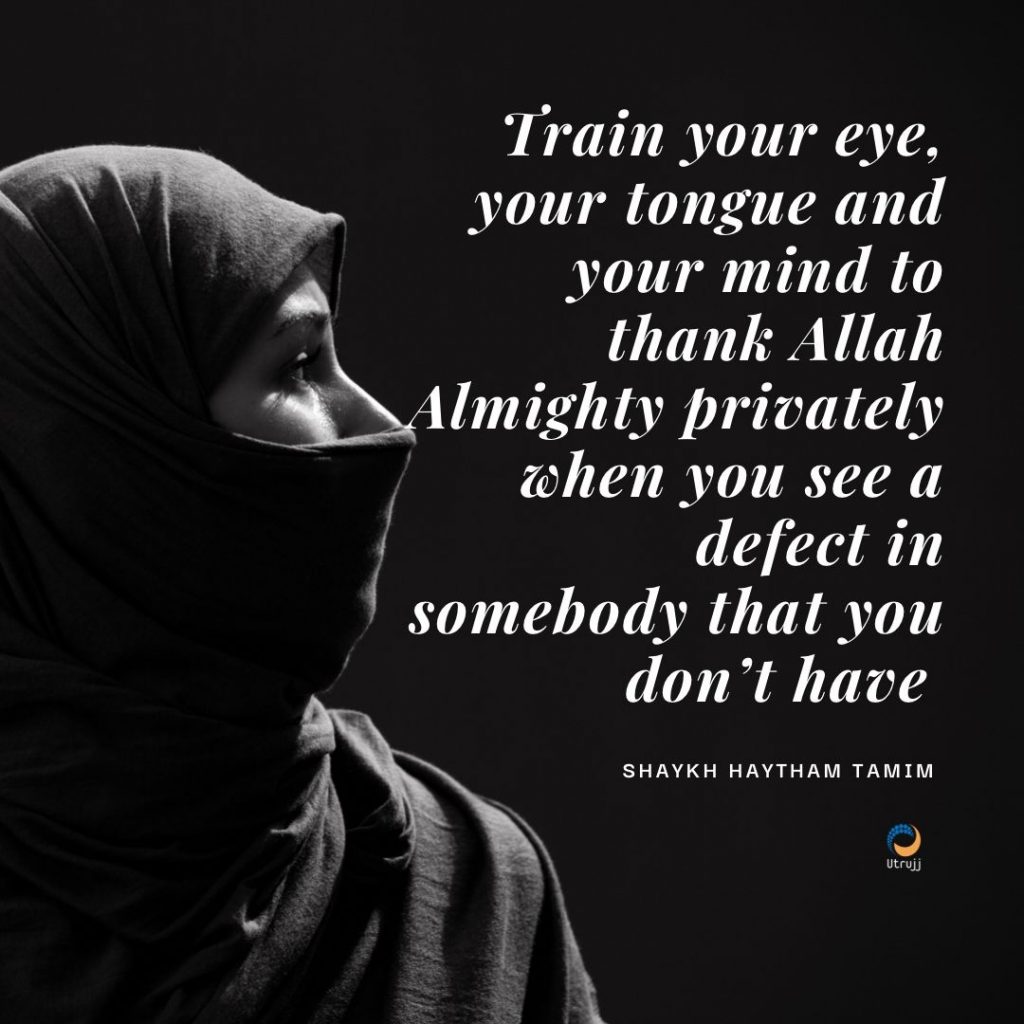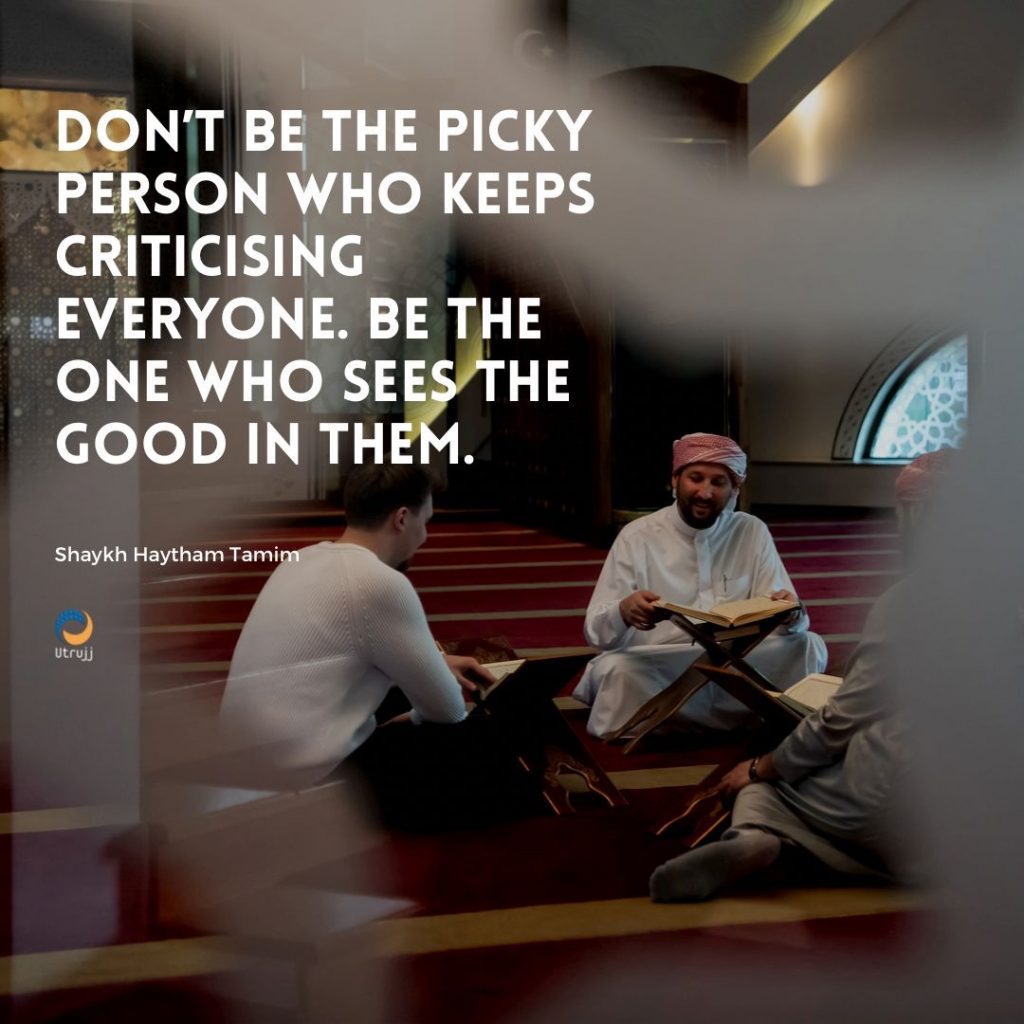What to do when you see a defect in someone

Anas bin Malik narrated that Allah’s Messenger (peace be upon him) said:
Tuba (which is a tree in paradise) will be for he who is too occupied with his own defects to mention the defects of other people’[Al-Bazzar[i]]
The Prophet (peace be upon him) here again is addressing the social context and etiquettes, which we need to revive and educate ourselves and spread.
There is discussion among the scholars to understand what Tuba is. One of the meanings is that Tuba is a tree in Jannah which is so huge that walking under its branches would take many years.
Abu Sa’id al-Khudri reported:
عَنْ أَبِي سَعِيدٍ الْخُدْرِيِّ عَنْ رَسُولِ اللَّهِ صَلَّى اللَّهُ عَلَيْهِ وَسَلَّم أَنَّهُ قَالَ لَهُ رَجُلٌ يَا رَسُولَ اللَّهِ مَا طُوبَى قَالَ
شَجَرَةٌ فِي الْجَنَّةِ مَسِيرَةُ مِئَةِ سَنَةٍ ثِيَابُ أَهْلِ الْجَنَّةِ تَخْرُجُ مِنْ أَكْمَامِهَا
A man said to the Messenger of Allah, peace and blessings be upon him, “What is Tuba (13:29)?” The Prophet said, “It is a tree in Paradise as wide as a hundred years of travel. The clothes of the people of Paradise will come from its leaves.” [Ibn Hibban]
Another meaning of Tuba is good news. And a third meaning is that Tuba comes from the word tayyiba taib, perfume and good things.
In other words, the hadith means that the one who leaves other’s defects to focus on their own will receive a great deal of reward.
What defects?
The one who is occupied with their own defects will earn reward, but what defects are these? There are two kinds – physical defects and flaws in one’s character. Physical defects would be deformity and disfigurement, or just being too short, too tall, too fat, too thin, etc.
The other kind is flaws in one’s character such as being too talkative, too shy, rude, brash etc. Those who focus on rectifying these will receive good news and will receive a good reward in the akhirah.
Whoever is focused on their own defects will improve themselves and become closer to Allah Almighty and be more loved by people. Meanwhile those who criticise, mock and belittle others are accumulating sins, disconnecting themselves from the people around them who are hurt by their comments and will find themselves isolated as no one will feel warmth for them, or support them when they need support or help because people felt hurt by them.
The Prophet (peace be upon him) is guiding us on what we should be engaged with and when we should keep silent.
The Prophet (peace be upon him) said:
‘Whomsoever believes in Allah and the last day, let him say something good or be silent’. [Bukhari and Muslim]
The hadith is clear – if you do not have something good to say, be silent! It’s difficult for many people. However people have to learn to bite their tongues. Talking all the time, endless chatter, and constantly speaking is bad.
If you notice a physical defect in someone, say, ‘Alhamdullillah, Allah protected me from this. Be grateful to Allah Almighty that you don’t have this defect, rather than drawing attention to the imperfections in someone’s appearance.

Abu Hurayrah reported that the Prophet (peace be upon him) said:
عَنْ أَبِي هُرَيْرَةَ عَنْ النَّبِيِّ صَلَّى اللَّهُ عَلَيْهِ وَسَلَّمَ قَالَ لَا يَسْتُرُ عَبْدٌ عَبْدًا فِي الدُّنْيَا إِلَّا سَتَرَهُ اللَّهُ يَوْمَ الْقِيَامَةِ
“A servant does not cover the faults of another servant in the world but that Allah will cover his faults on the Day of Resurrection.” [Muslim]
As in another hadith, if you were to expose someone’s defect or talk about someone’s defect then you may be afflicted by the same. Therefore one must be careful not to mock others or criticise their faults, as they may be afflicted with the same and worse.
The Prophet (peace be upon him) is teaching us how to tame our tendency to go wild when criticising others. For some people this is their specialty; whatever they see they find fault. This is fine if they work on a production line in a factory or quality control, but it doesn’t work with people. You can’t tell everybody what their defects are. This is rude and quite often unacceptable.

Instead of looking at other people’s defects, look at your own. If you are so good at finding other’s defects, then look at yourself. There is a saying that you should not focus on a strand in your brother’s eye and miss the big branch in your own. It means you magnify the tiniest mistakes of others, while blissfully or wilfully ignoring major defects in yourself.
It will not benefit you to expose people’s defects. What does it achieve? You may be able to list twenty of their defects but all you have done is put them in your account. No one would knowingly wish to do this.
Work on yourself
When it is related to physical appearance, you cannot change this, unless there is a deformity which can be operated on, for which there is a psychological point necessity. Then it’s fine to rectify it within the limits.
If there is nothing you can do about it, then there’s no point to hurt somebody by pointing out their defect. The Prophet (peace be upon him) defined the true believer, as the one who harms no one.
Abdullāh ibn ‘Amr and Jābir ibn ‘Abdullāh (may Allah be pleased with both of them) reported that the Prophet (peace be upon him) said:
عن عبد الله بن عمرو وجابر بن عبد الله رضي الله عنهم مرفوعاً: «المسلمُ من سَلِمَ المسلمونُ من لسانهِ ويَدِهِ، والمهاجرُ من هَجَرَ ما نهى اللهُ عنهُ». وعن أبي موسى رضي الله عنه قال: قلتُ: يا رسولَ اللهِ أَيُّ المسلمينَ أَفْضَلُ؟ قال: «مَنْ سَلِمَ المسلمونُ من لِسانِهِ وَيَدِهِ».
“The true Muslim is the one from whose tongue and hand the Muslims are safe, and the Muhājir (emigrant) is the one who abandons what Allah has forbidden.” [Bukhari and Muslim]
Abu Mūsa (may Allah be pleased with him) reported that he said:
[صحيح] – [حديث عبد الله بن عمرو رضي الله عنه: متفق عليه. حديث جابر رضي الله عنه: رواه مسلم. حديث أبي موسى رضي الله عنه: متفق عليه]
“O Messenger of Allah, who is the best among Muslims?” He said: “The one from whose tongue and hand the Muslims are safe.” [Bukhari and Muslim]
Instead of wasting time which Allah has given us, we should put our efforts towards good and accumulate good deeds in our account.
When the defect is not physical, for instance some is too hasty or too talkative, too hot-tempered, too stingy or envious, then again thank Allah that you are not like that. If you are so good at pinpointing these defects to others, then look at yourself and see are you really free from the character defects you see in others.

Look to thine own self
We have plenty of flaws to fix in ourselves. No one has the perfect character except the Prophet (peace be upon him).
When you see a defect in someone else, check yourself for it. If they are arrogant, are you sure that you have no arrogance in you? If they are a miser, are you sure you no miserliness in you? If someone talks too much, do you give others space to share in the conversation? Monitor your own self.
Ask Allah Almighty to help you get rid of your flaws work on fixing them. If you do this with the right approach, you will receive the good news, and the special reward in Jannah.
You will be a better person, as are harming anyone with your tongue or by your hand, as per the true definition of a Muslim.
Train your eye, your tongue and your mind to thank Allah Almighty privately, silently when you see a defect in somebody you don’t have.
This will give you humility and enable you to recognise the favours of Allah Almighty on you. You will not alienate others or accumulate sins by backbiting.
Give advice kindly, receive it gracefully
If someone says something about you which you disagree with, address it with them politely. If they have a defect which is affecting you, then you can address it with them gently.
We ask Allah Almighty to enable us to be always in line with the Sunnah of the Prophet (peace be upon him).
[i] Imam Al Bazzar was a great muhaddith, whose book Al Bahar is dedicated to hadith. It is full of good, authentic narrations, with a few weak narrations but in general it s a good and reliable source of hadith. This hadith is a good hadith although sometimes some chains might be weak but in the collection of the hadith, the narrations all together reflect a good narration.
Shaykh Haytham Tamim – Sunday Hadith Class (1305) 4th May 2022
Transcribed by Rose Roslan
Related posts
The Mistake Hunter – Being Critical for the Sake of It – Utrujj
What beauty treatments are permissible in Islam? Can women pluck their eyebrows? – Utrujj
- The truth is more powerful than lies
- Does a bride’s wali have to be Muslim?
- Is is permissible to lead a salah split over different rooms?
- Global IT outage. When systems go down…
- The concept of worship. What are ibadah and ihsan – and how do they lead to self development?

Recommended Posts

The truth is more powerful than lies
July 26, 2024

Global IT outage. When systems go down…
July 19, 2024

